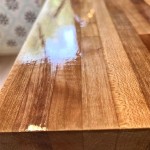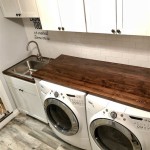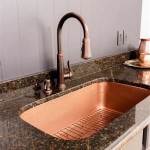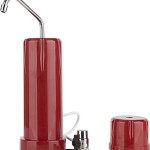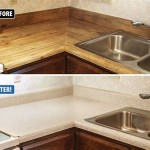Do You Have To Seal Granite Countertops
Granite is a popular choice for kitchen countertops due to its durability and beauty. However, like all natural stone, granite is porous and can absorb liquids and stains. To protect your granite countertops and keep them looking their best, it is important to seal them.
Granite sealers are available in a variety of finishes, including matte, satin, and glossy. The type of finish you choose will depend on the desired look and feel of your countertops. Matte finishes are less reflective and can help to hide scratches and imperfections, while satin and glossy finishes are more reflective and can give your countertops a more polished look.
When sealing granite countertops, it is important to follow the manufacturer's instructions carefully. Most sealers require two coats, and it is important to allow the first coat to dry completely before applying the second coat. Once the sealer has been applied, it is important to let it cure for the recommended amount of time before using your countertops.
How often you need to seal your granite countertops will depend on the type of sealer you use and the amount of use your countertops receive. Generally, it is recommended to seal your countertops every year or two, or more often if they are heavily used.
Sealing your granite countertops is an important part of maintaining their beauty and longevity. By following the manufacturer's instructions and reapplying the sealer as needed, you can keep your countertops looking their best for years to come.
Benefits of Sealing Granite Countertops
There are many benefits to sealing granite countertops, including:
- Protection from stains: Sealers help to protect granite countertops from stains caused by food, drinks, and other liquids.
- Protection from scratches: Sealers can help to protect granite countertops from scratches caused by knives, utensils, and other objects.
- Enhanced durability: Sealers can help to improve the durability of granite countertops by making them more resistant to wear and tear.
- Easier to clean: Sealed granite countertops are easier to clean than unsealed countertops, as dirt and grime will not adhere to the sealed surface.
- Improved appearance: Sealers can help to improve the appearance of granite countertops by enhancing their color and depth.
How to Seal Granite Countertops
Sealing granite countertops is a relatively easy process that can be done by do-it-yourselfers. Here are the steps involved:
1. Clean your countertops: Before you can seal your countertops, you need to clean them thoroughly to remove any dirt or debris. Use a mild dish soap and water to clean the countertops, and then rinse them thoroughly with clean water. 2. Dry your countertops: After you have cleaned your countertops, you need to dry them completely before you can apply the sealer. You can use a clean cloth or paper towels to dry the countertops. 3. Apply the sealer: Once your countertops are clean and dry, you can begin applying the sealer. Most sealers come with a sponge or brush that you can use to apply the sealer. Apply the sealer in a thin, even coat, and be sure to cover the entire surface of the countertops. 4. Allow the sealer to dry: Once you have applied the sealer, you need to allow it to dry completely before using your countertops. Most sealers require several hours to dry, so be sure to read the manufacturer's instructions carefully. 5. Buff the countertops: Once the sealer has dried, you can buff the countertops to remove any excess sealer and to give them a polished look. Use a clean cloth or paper towels to buff the countertops.Tips for Sealing Granite Countertops
Here are a few tips to help you get the best results when sealing your granite countertops:
Test the sealer in an inconspicuous area: Before you apply the sealer to your entire countertops, test it in an inconspicuous area to make sure that you like the results. This will also give you a chance to practice your application technique. Use a high-quality sealer: When choosing a sealer, be sure to use a high-quality product that is specifically designed for granite countertops. This will help to ensure that the sealer will provide adequate protection for your countertops. Follow the manufacturer's instructions: Be sure to follow the manufacturer's instructions carefully when applying the sealer. This will help to ensure that the sealer is applied correctly and that it provides the best possible protection for your countertops.How Often Should You Seal Granite Countertops Graniteheroes

How To Treat Seal Granite Marble Countertops Lesher

How Often Should You Seal Granite Countertops Eagle Stones

Is It Necessary To Seal Stone
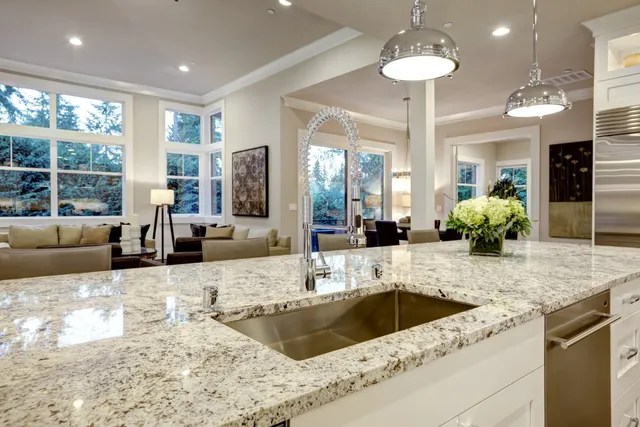
How Often Do You Have To Seal Granite Counters

How To Seal Granite Countertops

How A Sealer Protects Your Granite Countertops

How To Clean Seal And Polish Granite Countertops Pro Housekeepers

See How A Stone Sealing And Seam Repair Made This Granite Countertop In Mesa Az Shine Again

How Often Do I Need To Seal Granite Selection
See Also

